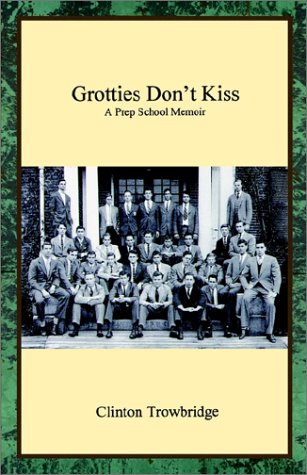As I grow older, I think less and less about trying my hand at fiction. For an old man who has kept his eyes open and made a few mental notes of what he has seen, the great temptation is to write a memoir. Even a good novel may never find a publisher, while even a bad memoir will be read, if only in typescript, by friends and relations, either to see what made the old man tick or, more often, to find reasons to laugh at him. Clinton Trowbridge (Groton class of 1946), giving in to the temptation, has produced a book that will be enjoyed by a circle of readers who have never known a Trowbridge and never attended Groton.
Grotties Don’t Kiss is successful memoir written in plain English. The author, by his own account, has gone through life without pretending to understand too much of it, and he records the strange things that have happened with the lack of guile that bears witness to his own follies. Trowbridge, an English professor turned essayist, explains on the first page that, at the age of 12, he “was sent away to boarding school, because, for one thing, it was cheaper than keeping me at home.” Trowbridge père was a minister and friend of the headmaster, and young Clint (if I may take the liberty) was a “gargantuan eater” who consumed the price of tuition “in boiled potatoes alone.”
Clint is not especially mischievous, but he can never stay out of trouble. He is no Tom Brown or Stalkey, only a hard-luck case who always seems to get caught, racking up demerits as if he were competing for a prize. I sympathize. As a high-school sophomore, I once received a minus-40 in deportment (100 was perfect; 70, passing), for nothing more serious than locking the biology teacher in the supply closet and running off to play soccer (a game I otherwise detested).
Trowbridge’s Groton years span the late 30’s and all of World War II. Groton was naturally Anglophile, and the boys were asked to help the British by making blankets and scarves. “Groton Knits While St. Mark’s Drills” ran the headline in a Boston newspaper. Boys are less susceptible to propaganda than adults are, and, when his father called for Lindbergh’s execution or hailed de Gaulle as the savior of Europe, Clint was quietly hoping the reverend gentleman would shut up and not spoil the fishing. “We were supposed to be saving tinfoil and cheering each time the British bombed another city in Germany, but all I wanted to do was to go sailing and play tennis and forget about all that.”
The worst nightmare of prep-school life is the predatory homosexual, by no means as common at Groton (as an English refugee explains) as in Britain. Nonetheless, Trowbridge was picked on by an older student, who repeatedly made degrading attacks on him. Trowbridge, in telling this unpleasant tale with the same terse narrative as the rest of the book, offers a quick glimpse into a sick mind of an abuser who cannot admit the nature of his own desires, which he projects upon his victim. As I read his matter-of-fact account, I began to understand some of the bizarre stories I had heard of locker-room rapes performed by apparently macho young athletes.
Young Clint was not much of a student, and, like too many English professors, he had little respect for the formalities of language:
I wasn’t good at any subject . . . But in Latin I was hopeless. I couldn’t have cared less how many parts Gaul was divided into; and why, I kept asking myself, were we studying a language that nobody spoke any more? Not that French was any better.
He learned enough Latin, however, to give some strength and clarity (if not strict correctness) to his prose. I know my highly grammatical and literate friends in the profession will forgive me if I say that, in general, English professors have the worst grammar and write the worst prose in the academy. I well remember my Latin professor reading Professor Trowbridge’s angry letter of resignation from the faculty of the College of Charleston and blue-penciling the mistakes. Yes, Clinton Trowbridge was my teacher in freshman comp, a class I had to take because he detested (quite correctly) my initial essay, which had been written in an “experimental” prose style based on what the Greeks called an apo tou koinou construction. What is surprising is that I was not sent in for a psychological evaluation.
I had my ups and downs with Clint. Since I hated going to class—and three cuts were grounds for expulsion—he allowed me to sit in the window at the back of the room and read. I broke my part of the bargain, which was not to disrupt the class, when he turned it into a necktie party, with Wordsworth as the designated victim. I hated Wordsworth up to that moment, but, listening to the dimwitted attack (led by a girl whose brother I would know in later years as a conservative Calvinist), I became an archdefender of the Lake Poets (and still am). Relations did not especially improve in the next few years, and I recall an exchange of insults at a party, Clint’s iron grip (sailing had given him strong arms and hands), and my sucker-punch to his academically soft underbelly. I never did apologize. (Sorry for being a jerk.)
Teachers, by definition, are not human beings, though young Trowbridge seems to have appreciated his teachers better than I did, and it gave me a rare pleasure to read this charming and unself-conscious memoir of a hardworking and dedicated teacher.
[Grotties Don’t Kiss: A Prep School Memoir, by Clinton Trowbridge (Port Jefferson, NY: The Vineyard Press) 211 pp., $19.95]

Leave a Reply